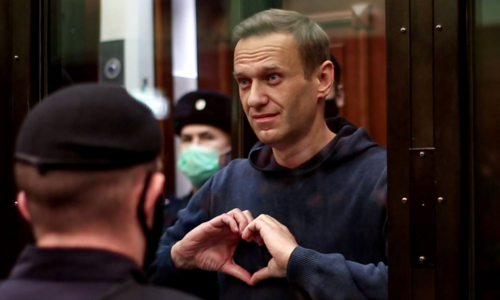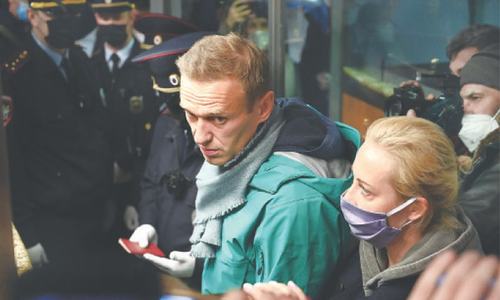Imprisoned Russian opposition leader Alexei Navalny was awarded the European Union’s top human rights prize on Wednesday in a clear slap at President Vladimir Putin.
In awarding the Sakharov Prize to Navalny, the European Parliament praised his “immense personal bravery.”
The 45-year-old activist was poisoned with a nerve agent last year and promptly arrested upon his return to Moscow from treatment in Germany and later imprisoned.
“He has campaigned consistently against the corruption of Vladimir Putin’s regime, and through his social media accounts and political campaigns, Navalny has helped expose abuses and mobilise the support of millions of people across Russia. For this, he was poisoned and thrown in jail,” European Parliament President David Sassoli said in a statement.
Sassoli also called for Navalny’s immediate release.
Russia-EU ties
The recognition of Navalny will further sour relations between the 27-nation bloc and Russia. These ties have been on the decline for years, especially following Moscow’s 2014 annexation of Ukraine’s Crimean Peninsula and its support for a separatist insurgency in eastern Ukraine.
The impact reverberated beyond the European Union (EU) as well.
Days after Russia suspended its mission at the North Atlantic Treaty Organistan (Nato) and ordered the closure of the alliance’s office in Moscow in retaliation to Nato’s expulsion of Russian diplomats, the organisation’s chief said he embraced the news.
“I welcome the fact that a strong voice ... in Russia has been awarded this prize,” Nato Secretary General Jens Stoltenberg told reporters. He said the prize was also a call for “his unconditional release from prison” and to have an "international investigation” into it.
Stoltenberg recalled that the Nato considered the treatment of Navalny as part of a “pattern where we see that Russia has become more oppressive at home and more aggressive abroad.”
Russia’s treatment of Navalny has only exacerbated matters. The EU has been calling for his immediate and unconditional release in what it sees as a politically motivated imprisonment and has said it holds Moscow responsible for his health.
The EU imposed sanctions last year on six senior Russian officials for their alleged involvement in the poisoning of Navalny. The Kremlin has denied any involvement.
With the standoff between Brussels and Moscow continuing, the move by European legislators in awarding the prize to Navalny puts it back at the heart of the political debate.
“It is an important signal, also to the Kremlin, that the EU will not give in to pressure and blackmail or be fooled by empty promises,” said Sergey Lagodinsky, a member of Greens/European Free Alliance — a political group of the European Parliament — from Germany.
Navalny’s top associate Leonid Volkov, tweeted that the prize was “well-deserved,” and he thanked all those who have supported the opposition leader.
“Hoorah!” tweeted another Navalny’s ally, Ivan Zhdanov.
Other candidates
The 50,000-euro prize will be presented at the December 15 session of the European Parliament in Strasbourg, France. Other candidates had included a group of Afghan women and imprisoned Bolivian politician and former interim president Jeanine Anez.
The Afghan women, who include human rights activists, a journalist and cultural figures, had also been strong contenders. The fate of Afghan women has taken the centre stage since the Taliban took power in the wake of the US military departure from the country in August.
Despite initial promises to protect the rights of women, especially in education, the Taliban have come under criticism, including from the United Nations, for not sticking to those commitments.
The EU award, named for Soviet dissident Andrei Sakharov, was created in 1988 to honor individuals or groups who defend human rights and fundamental freedoms. Sakharov, a Nobel Peace Prize laureate, died in 1989.
It was the second straight year it has gone to those challenging authoritarian leaders. Last year, it went to the Belarus opposition movement and its leader, Sviatlana Tsikhanouskaya, for their challenge to President Alexander Lukashenko’s rule following a widely disputed election in 2020.














































